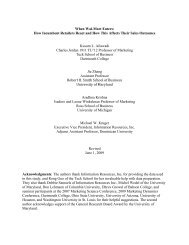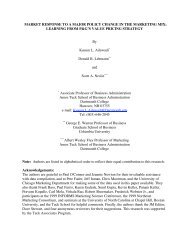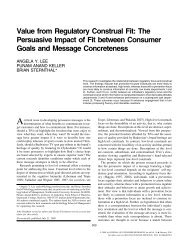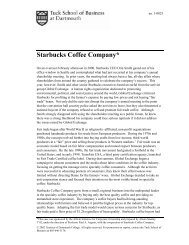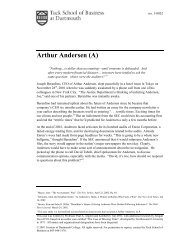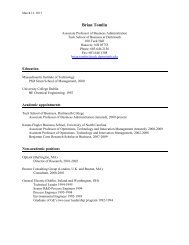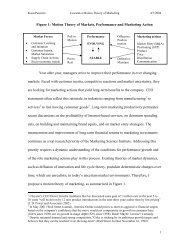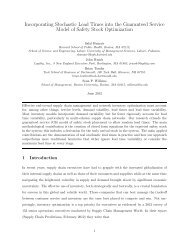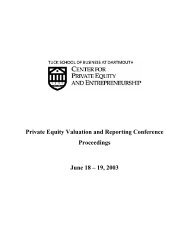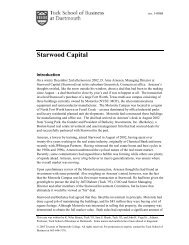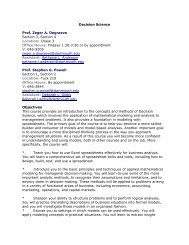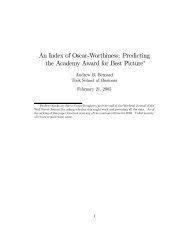tax notes international - Tuck School of Business - Dartmouth College
tax notes international - Tuck School of Business - Dartmouth College
tax notes international - Tuck School of Business - Dartmouth College
Create successful ePaper yourself
Turn your PDF publications into a flip-book with our unique Google optimized e-Paper software.
Figure 2. Annual Flow <strong>of</strong> Tax-Advantaged Foreign Earnings <strong>of</strong> 40 U.S. Multinationals, 2003-2007<br />
Billions<br />
$140<br />
$120<br />
$100<br />
$80<br />
$60<br />
$40<br />
$20<br />
$0<br />
$60.1<br />
$67.6<br />
For this group <strong>of</strong> 40, the accumulated stock <strong>of</strong> unrepatriated<br />
foreign earnings hit a temporary low in<br />
2005 <strong>of</strong> $300.3 billion. Under the Jobs Act provisions,<br />
these companies repatriated a total <strong>of</strong> $184.8 billion <strong>of</strong><br />
foreign earnings — about 90 percent in that year. By<br />
the end <strong>of</strong> fiscal 2007 these multinationals had replenished<br />
their stash <strong>of</strong> unrepatriated earnings to $518 billion<br />
— a 72 percent increase in two years. These totals<br />
are shown in a solid line in Figure 1. Company-bycompany<br />
figures are presented in the table at the end<br />
<strong>of</strong> the article.<br />
Another view is provided in Figure 2. It shows<br />
growth in the stock <strong>of</strong> unrepatriated foreign earnings<br />
plus earnings repatriated under the Jobs Act. In other<br />
words, it shows the annual change in accumulated foreign<br />
earnings that would have occurred each year without<br />
the Jobs Act. This is a measure <strong>of</strong> how much<br />
pr<strong>of</strong>it multinationals are keeping <strong>of</strong>fshore to maximize<br />
<strong>tax</strong> advantages. From 2003 to 2007 the annual increase<br />
approximately doubled — from $60 billion to $122 billion.<br />
The two figures show multinationals are loading up<br />
on unrepatriated earnings at a far greater rate than before<br />
the <strong>tax</strong> holiday legislated in 2004. This is a result<br />
<strong>of</strong> higher worldwide pr<strong>of</strong>itability since the prior recession<br />
and an increasingly larger share <strong>of</strong> business activity<br />
taking place abroad. But as documented previously<br />
in these pages, it is also a result <strong>of</strong> greater pr<strong>of</strong>it shifting<br />
by multinationals out <strong>of</strong> the United States and into<br />
$95.0 $96.4<br />
$122.1<br />
2003 2004 2005<br />
Fiscal Years<br />
2006 2007<br />
Source: Dotted line in Figure 1.<br />
foreign jurisdictions. (For that discussion, see Tax Notes<br />
Int’l, Mar. 17, 2008, p. 910, Doc 2008-4725, or2008<br />
WTD 49-5.)<br />
What’s Next?<br />
HIGHLIGHTS<br />
These data suggest that the pressure for another repatriation<br />
holiday may be greater than ever. Despite<br />
this, it looks like the growing opposition could thwart<br />
any repeat.<br />
First <strong>of</strong> all, there is widespread skepticism that these<br />
repatriations work as advertised. For most lawmakers,<br />
the debate about the need for a repeat <strong>of</strong> the ‘‘onetime’’<br />
<strong>tax</strong> relief for repatriated dividends centers on the<br />
economy and job creation. Did those lucky multinationals<br />
increase jobs as they told Congress they would<br />
and as they outlined in their legally required dividend<br />
repatriation investment plans? The evidence is in, and<br />
the answer clearly is no. (Dharmapala, Foley, and<br />
Forbes, ‘‘The Unintended Consequences <strong>of</strong> the Homeland<br />
Investment Act: Implications for Financial Constraints,<br />
Governance, and International Tax Policy,’’<br />
2008.)<br />
Besides job creation, there is the additional issue <strong>of</strong><br />
how temporary repatriation relief affects the web <strong>of</strong><br />
global <strong>tax</strong> checks and balances. Repeated ‘‘one-time’’<br />
relief would send a signal to multinationals that they<br />
no longer need to consider pr<strong>of</strong>its shifted <strong>of</strong>fshore as<br />
trapped. This increases the benefit <strong>of</strong> aggressive transfer<br />
pricing practices that would otherwise be held in<br />
TAX NOTES INTERNATIONAL FEBRUARY 2, 2009 • 377<br />
(C) Tax Analysts 2009. All rights reserved. Tax Analysts does not claim copyright in any public domain or third party content.



